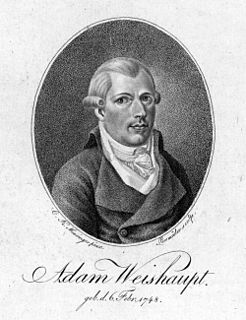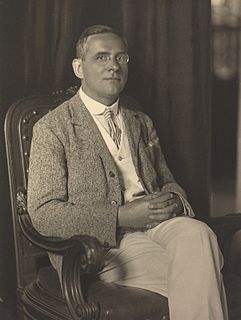A Quote by Karl Popper
To give a causal explanation of an event means to deduce a statement which describes it, using as premises of the deduction one or more universal laws, together with certain singular statements, the initial conditions ... We have thus two different kinds of statement, both of which are necessary ingredients of a complete causal explanation.
Related Quotes
But I have contrived an explanation which has every advantage; is inviting to christians of every communion; gradually frees them from all religious prejudices; cultivates the social virtues; and animates them by a great, a feasable, a speedy prospect of universal happiness, in a state of liberty and moral equality, freed from the obstacles which subordination, rank, and riches, continually throw in our way. My explanation is accurate and complete, my means are effectual, and irresistable. Our secret association works in a way that nothing can withstand, and man shall soon be free and happy.
[Theory is] an explanation that has been confirmed to such a degree, by observation and experiment, that knowledgeable experts accept it as fact. That's what scientists mean when they talk about a theory: not a dreamy and unreliable speculation, but an explanatory statement that fits the evidence. They embrace such an explanation confidently but provisionally - taking it as their best available view of reality, at least unil some severely conflicting data or some better explanation might come along.
With the unknown, one is confronted with danger, discomfort, and care; the first instinct is to abolish these painful states. First principle: any explanation is better than none. . . . The causal instinct is thus conditional upon, and excited by, the feeling of fear. The "why?" shall, if at all possible, not give the cause for its own sake so much as for a particular kind of cause -- a cause that is comforting, liberating, and relieving.
Coincidence may be described as the chance encounter of two unrelated causal chains which-miraculously, it seems-merge into a significant event. It provides the neatest paradigm of the bisociation of previously separate contexts, engineered by fate. Coincidences are puns of destiny. In the pun, two strings of thought are tangled into one acoustic knot; in the coincidental happening, two strings of events are knitted together by invisible hands.
The Universe was a silly place at best...but the least likely explanation for it was the no-explanation of random chance, the conceit that abstract somethings 'just happened' to be atoms that 'just happened' to get together in ways which 'just happened' to look like consistent laws and some configurations 'just happened' to possess self-awareness and that two 'just happened' to be the Man from Mars and a bald-headed old coot with Jubal inside.
In one of the most brilliant papers in the English language Hume made it clear that what we speak of as 'causality' is nothing more than the phenomenon of repetition. When we mix sulphur with saltpeter and charcoal we always get gunpowder. This is true of every event subsumed by a causal law in other words, everything which can be called scientific knowledge. "It is custom which rules ," Hume said, and in that one sentence undermined both science and philosophy .
Confusion conditions activity, which conditions consciousness, which conditions embodied personality, which conditions sensory experiences, which conditions impact, which conditions mood, which conditions craving, which conditions clinging, which conditions becoming, which conditions birth, which conditions aging and death.
The underlying physical laws necessary for the mathematical theory of a large part of physics and the whole of chemistry are thus completely known, and the difficulty is only that the exact application of these laws leads to equations much too complicated to be soluble. It therefore becomes desirable that approximate practical methods of applying quantum mechanics should be developed, which can lead to an explanation of the main features of complex atomic systems without too much computation.






































